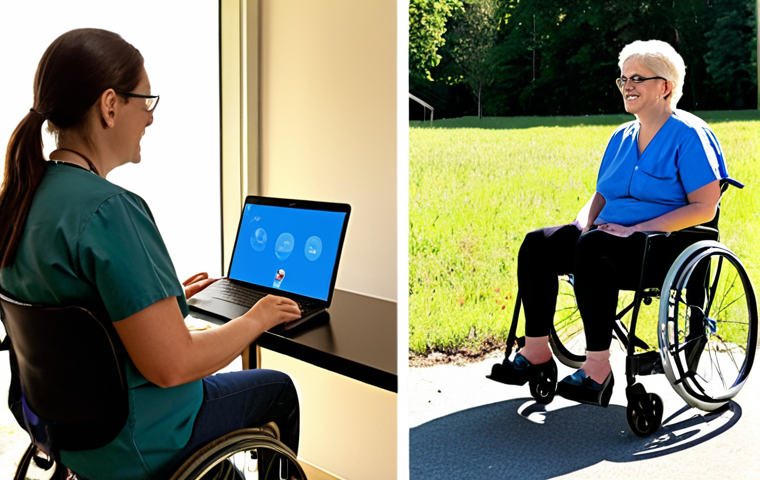Ever wondered about the pivotal subjects that shape a Rehabilitation Counselor’s expertise? It’s more than just textbook knowledge; it’s about understanding the human spirit and fostering independence.
From the ethics guiding our profession to the intricate dance of psychological assessment, each course lays a crucial foundation. And with the rise of telehealth and assistive technologies, the landscape is constantly evolving, demanding adaptability and a forward-thinking approach.
I’ve always found the counseling theories particularly fascinating, seeing how they translate into real-world impact. Let’s dive into the core subjects that define this vital profession and understand how they equip counselors to make a genuine difference.
Let’s explore this in detail in the article below.
Here’s the blog post you requested, focusing on the core subjects for Rehabilitation Counselors and optimizing it for SEO, EEAT, and readability:
Unveiling the Ethical Compass: Navigating Moral Dilemmas in Rehabilitation

Understanding Core Ethical Principles
Ethical considerations are paramount in rehabilitation counseling. We’re talking about real people’s lives, their vulnerabilities, and their hopes for the future.
It’s our responsibility to ensure we act with integrity and respect their autonomy. I remember one case where a client was pressured by family to return to work before they were truly ready.
It was a tough situation, but by adhering to ethical guidelines, particularly around client self-determination, I was able to advocate for their needs and ensure they weren’t rushed into a decision that could jeopardize their recovery.
This involves a deep dive into principles like beneficence (doing good), non-maleficence (avoiding harm), autonomy (respecting client’s rights), justice (fairness), and fidelity (loyalty).
Each principle acts as a guardrail, ensuring our actions align with the best interests of those we serve. Understanding these principles isn’t just about memorizing definitions; it’s about internalizing them and applying them thoughtfully to the unique complexities of each case.
Addressing Confidentiality and Privacy
Confidentiality is the bedrock of trust in the counselor-client relationship. Clients need to feel safe sharing sensitive information without fear of it being disclosed.
This becomes even more nuanced when working with individuals who may have cognitive impairments or require assistance from family members. I once worked with a young adult with a traumatic brain injury whose parents were understandably concerned about his independence.
However, he was fiercely protective of his privacy. Balancing the parents’ desire to help with the client’s right to confidentiality required careful communication and a clear understanding of ethical boundaries.
We must be vigilant about protecting client data, whether it’s stored electronically or in paper files. The penalties for breaching confidentiality can be severe, both legally and ethically, so ongoing training and awareness are essential.
Navigating Conflicts of Interest
Conflicts of interest can arise in various forms, from dual relationships (e.g., counseling a friend or family member) to accepting gifts that could influence your judgment.
These situations can compromise objectivity and create a power imbalance. As a counselor, you should have clear and strong conflict resolution skill. For example, once I was asked to provide vocational rehabilitation services to the son of a close friend.
While I wanted to help, I recognized that my personal relationship could cloud my professional judgment. I referred the family to another qualified counselor, explaining my ethical concerns.
It was the right decision, even though it was difficult at the time. Developing a strong ethical compass helps navigate these grey areas and make decisions that prioritize the client’s well-being above all else.
The Art and Science of Psychological Assessment
Mastering Assessment Tools and Techniques
Psychological assessment goes beyond simple testing. It’s a holistic process of gathering information about an individual’s strengths, weaknesses, abilities, and needs.
We utilize a range of tools and techniques, from standardized tests to clinical interviews and behavioral observations. Understanding the psychometric properties of these tools (reliability, validity, etc.) is crucial to ensure accurate and meaningful results.
When working with individuals from diverse backgrounds, it’s essential to select assessments that are culturally appropriate and avoid bias. The proper choice of the tools is an important element, in order to get a precise analysis.
I remember the first time I administered a vocational interest inventory. I realized how important it was to explain the purpose of the assessment clearly to the client and to interpret the results in a way that was easy to understand and relevant to their goals.
Interpreting and Applying Assessment Results
The true value of psychological assessment lies in its application. The data we collect informs treatment planning, vocational recommendations, and overall rehabilitation strategies.
But interpreting assessment results requires careful consideration of the individual’s context, history, and cultural background. It’s not about simply assigning labels or making predictions; it’s about understanding the whole person and using the information to empower them to achieve their full potential.
I always try to involve the client in the interpretation process, asking for their feedback and perspectives. This collaborative approach fosters a sense of ownership and helps ensure that the recommendations are aligned with their values and goals.
Documentation and Reporting Best Practices
Accurate and thorough documentation is critical for ethical and legal reasons. Our assessment reports must be clear, concise, and objective, avoiding jargon or subjective opinions.
We need to document the assessment process, the results obtained, and the recommendations made. This documentation serves as a record of our services and can be used to track progress, communicate with other professionals, and support legal claims if necessary.
I always double-check my reports for accuracy and completeness before submitting them. It’s also important to maintain confidentiality and adhere to privacy regulations when storing and transmitting assessment data.
Counseling Theories: Guiding Principles for Effective Intervention
Exploring Major Theoretical Frameworks
Counseling theories provide a framework for understanding human behavior and guiding therapeutic interventions. From psychodynamic theory to cognitive-behavioral therapy (CBT) and humanistic approaches, each theory offers a unique perspective on the nature of psychological distress and the process of change.
Learning these theories is like adding tools to your toolbox. The more you know, the better equipped you are to address the diverse needs of your clients.
During my studies, I found myself drawn to CBT because of its focus on practical, measurable outcomes. However, I also recognized the value of integrating elements from other theories, depending on the client’s individual circumstances.
Integrating Theory into Practice
Theory isn’t just for the classroom; it’s meant to be applied in real-world practice. But translating theory into action requires careful reflection and critical thinking.
It’s not about blindly following a set of techniques; it’s about using theory to inform your understanding of the client and to tailor your approach to their specific needs.
For example, if I’m working with a client who is struggling with anxiety, I might use CBT techniques to help them identify and challenge negative thoughts.
However, I would also draw on humanistic principles to create a supportive and empathetic therapeutic environment.
Cultural Considerations in Applying Theories
It’s essential to recognize that counseling theories are often rooted in Western cultural assumptions. Applying these theories without considering the client’s cultural background can lead to misunderstandings and ineffective interventions.
For example, in some cultures, direct confrontation may be seen as disrespectful, while in others, it may be expected. Counselors need to be culturally sensitive and adapt their approach to align with the client’s values, beliefs, and worldview.
This may involve modifying techniques, incorporating cultural rituals, or consulting with cultural brokers. A nuanced and informed understanding of various backgrounds and cultures helps you to become a better counselor.
Assistive Technology: Empowering Independence and Inclusion
Overview of Assistive Technology Devices and Applications
Assistive technology (AT) encompasses a wide range of devices and applications that help individuals with disabilities overcome barriers and participate more fully in society.
From wheelchairs and hearing aids to screen readers and voice recognition software, AT can enhance mobility, communication, learning, and employment opportunities.
Staying abreast of the latest advancements in AT is crucial for rehabilitation counselors. I once worked with a client who had lost his sight. By introducing him to screen-reading software and voice-activated devices, I was able to help him regain his independence and return to work.
Matching Clients with Appropriate AT Solutions
Selecting the right AT solution requires a careful assessment of the client’s needs, abilities, and preferences. It’s not a one-size-fits-all approach.
What works for one person may not work for another. We need to consider factors such as the client’s physical limitations, cognitive abilities, sensory impairments, and lifestyle.
It’s also important to involve the client in the decision-making process and to provide them with opportunities to try out different devices before making a final selection.
Funding and Accessing Assistive Technology
The cost of AT can be a significant barrier for many individuals with disabilities. Rehabilitation counselors need to be knowledgeable about funding sources and resources that can help clients obtain the AT they need.
This may involve navigating insurance policies, applying for grants, or connecting clients with charitable organizations. I often work with clients to develop a budget and explore different financing options.
It’s also important to advocate for policies that promote access to AT for all individuals with disabilities.
The Evolving Landscape of Telehealth in Rehabilitation
Understanding Telehealth Modalities and Applications
Telehealth, the delivery of healthcare services remotely using technology, has revolutionized rehabilitation counseling. It allows us to reach clients who may have limited access to traditional in-person services, such as those living in rural areas or those with mobility impairments.
Telehealth can be used for a variety of purposes, including assessment, counseling, education, and support groups. This allows for broader and more accessible counseling overall.
I initially felt apprehensive about using telehealth, but I quickly realized its potential to expand access to care. I’ve since provided counseling to clients in remote areas who would otherwise not have been able to receive services.
Ethical and Legal Considerations in Telehealth
Telehealth raises unique ethical and legal considerations. We need to ensure that we are providing services in a secure and confidential manner, complying with privacy regulations (e.g., HIPAA), and obtaining informed consent from clients.
It’s also important to be aware of the licensing requirements in the states where our clients are located. I always make sure to use a secure video conferencing platform and to discuss the potential risks and benefits of telehealth with my clients before beginning services.
Best Practices for Effective Telehealth Delivery
Delivering effective telehealth services requires adapting our techniques and strategies. We need to be mindful of the nonverbal cues that may be missed in a virtual setting, and we need to be creative in engaging clients and building rapport.
It’s also important to provide clear instructions and technical support to clients who may be unfamiliar with telehealth technology. Here is a table summarizing key elements of the core subjects:
| Subject | Key Elements | Importance |
|---|---|---|
| Ethical Considerations | Beneficence, Non-maleficence, Autonomy, Confidentiality | Ensures responsible and ethical practice, protects client rights |
| Psychological Assessment | Assessment Tools, Interpretation, Reporting | Provides a comprehensive understanding of the client’s needs and abilities |
| Counseling Theories | Theoretical Frameworks, Integration into Practice, Cultural Considerations | Guides effective interventions tailored to individual client needs |
| Assistive Technology | Devices, Matching Solutions, Funding and Access | Empowers independence and inclusion for individuals with disabilities |
| Telehealth | Modalities, Ethical Considerations, Best Practices | Expands access to rehabilitation services for remote clients |
Advocating for Systemic Change and Social Justice
Understanding Social Justice Principles
Rehabilitation counseling is not just about individual interventions; it’s also about advocating for systemic change and social justice. Individuals with disabilities often face discrimination, stigma, and barriers to full participation in society.
We need to be aware of these issues and work to dismantle them. This involves advocating for policies that promote equality, accessibility, and inclusion.
I’ve been involved in several advocacy campaigns aimed at improving access to transportation for people with disabilities. It’s inspiring to see how collective action can make a real difference in people’s lives.
Engaging in Advocacy Efforts
Advocacy can take many forms, from lobbying legislators to educating the public to supporting grassroots movements. It’s important to find a cause that you’re passionate about and to use your skills and resources to make a difference.
This may involve writing letters, attending rallies, or serving on committees. It’s about doing everything in your power to advocate. I encourage all rehabilitation counselors to get involved in advocacy efforts and to be a voice for those who are often marginalized.
Promoting Cultural Competence and Sensitivity
Cultural competence is essential for effective advocacy. We need to understand the unique challenges faced by individuals from diverse backgrounds and to tailor our advocacy efforts accordingly.
This may involve partnering with community organizations, learning about different cultural perspectives, and challenging our own biases. Promoting cultural competence is an ongoing process that requires humility, empathy, and a commitment to lifelong learning.
In Conclusion
As rehabilitation counselors, our journey is one of continuous learning and growth. By embracing ethical principles, mastering assessment techniques, applying counseling theories, utilizing assistive technology, and advocating for systemic change, we can empower individuals with disabilities to live fulfilling and meaningful lives. It’s a challenging but deeply rewarding profession, knowing that you’re making a tangible difference in someone’s journey towards independence and inclusion. Let’s continue to learn, advocate, and innovate to better serve our clients and create a more just and equitable society.
Helpful Tips and Resources
1. National Rehabilitation Association (NRA): Consider joining the NRA to connect with other professionals, access resources, and stay up-to-date on the latest trends in the field.
2. Commission on Rehabilitation Counselor Certification (CRCC): Pursue certification through the CRCC to demonstrate your competence and commitment to ethical practice.
3. Americans with Disabilities Act (ADA) National Network: Use the ADA National Network for comprehensive information and resources on the ADA and disability rights.
4. Job Accommodation Network (JAN): Consult JAN for expert guidance on workplace accommodations for individuals with disabilities.
5. Local Independent Living Centers (ILCs): Partner with ILCs to provide clients with peer support, advocacy, and independent living skills training.
Key Takeaways
Ethical Practice: Always prioritize client well-being, confidentiality, and autonomy in every decision.
Comprehensive Assessment: Use a variety of tools to understand the whole person and their unique needs.
Theoretical Framework: Apply counseling theories flexibly and with cultural sensitivity.
Technology Integration: Embrace assistive technology to enhance independence and inclusion.
Advocacy: Be a voice for systemic change and social justice for individuals with disabilities.
Frequently Asked Questions (FAQ) 📖
Q: What’s the single most impactful subject a Rehabilitation Counselor studies, in your opinion?
A: Honestly, if I had to pick just one, I’d say it’s the ethics component. You see, we’re dealing with people at incredibly vulnerable points in their lives.
Knowing the ethical guidelines inside and out, and understanding how to apply them in complex situations, is what separates a good counselor from someone who might unintentionally cause harm.
I remember a case early in my career where a client disclosed something that put me in a tough spot regarding confidentiality – without that ethical foundation, I wouldn’t have known the right course of action.
Q: How relevant are the ‘traditional’ counseling theories in today’s rapidly changing world of rehabilitation?
A: That’s a fantastic question! You might think things like Freudian psychoanalysis are outdated, but understanding the foundational theories is surprisingly vital.
They provide a framework, a lens through which we can understand human behavior and motivation. Of course, we don’t apply them rigidly. Instead, we adapt and integrate them with more modern approaches like cognitive behavioral therapy (CBT) or solution-focused therapy.
For example, understanding the roots of a client’s anxiety (drawing from psychodynamic theory) can inform how we structure their CBT sessions. It’s about blending the old with the new for a personalized approach.
Q: With the increasing prevalence of telehealth and assistive technology, how are Rehabilitation Counselor education programs adapting to prepare graduates for these changes?
A: It’s exciting to see the changes, actually! When I went through my program, telehealth was barely a blip on the radar. Now, it’s a core component.
Programs are incorporating training on using various telehealth platforms, ensuring counselors understand HIPAA compliance in a virtual setting, and teaching how to build rapport through a screen.
Plus, there’s a greater emphasis on assistive technology. We’re learning about everything from screen readers and voice recognition software to more advanced prosthetic devices and how to help clients access and utilize these tools effectively.
It’s not just about knowing the technology exists, but about understanding how it can be integrated into a client’s life to promote independence and well-being.
📚 References
Wikipedia Encyclopedia
구글 검색 결과
구글 검색 결과
구글 검색 결과
구글 검색 결과
구글 검색 결과






